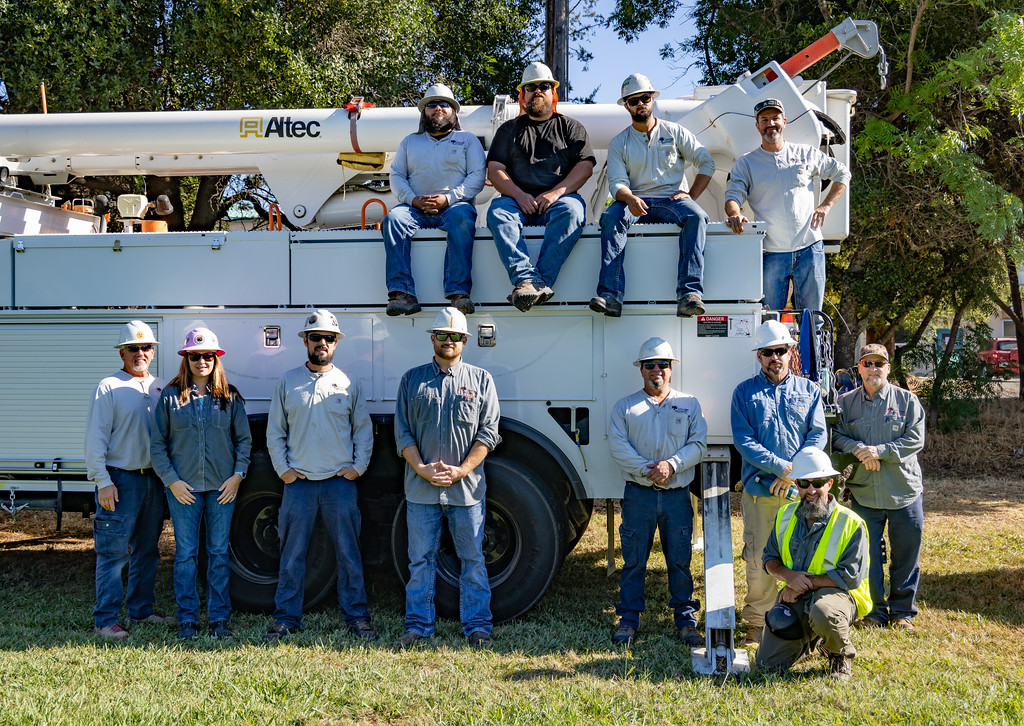
Local 1245 members at the City of Ukiah Electric Utility, left to right: Line Crew Foreman Dan Quarles, Electrical Engineering Technician Kahli Johnson, Line Crew Foreman James Jeffers, Electrical Tech Grady Hurn, Journeyman Lineman Chad Crosthwait, Journeyman Lineman Dennis Pardini, (on knee) Engineering Tech Scott Bozzoli, Electrical Tech James O’Brien, (on top of truck from left), Apprentice Lineman Joseph Garcia, Intern Allen Davison Jr., Journeyman Lineman Dustin Butler, Electrical Tech Scott Branson.
Nestled in a sprawling valley surrounded by the Mendocino National Forest, the scenic town of Ukiah serves as the main commercial and retail hub for nearly all of the residents in rural Mendocino and Lake counties.
A small but dedicated team of IBEW 1245 members keep Ukiah’s electric utility running smoothly for its 16,000 residents and visitors alike.
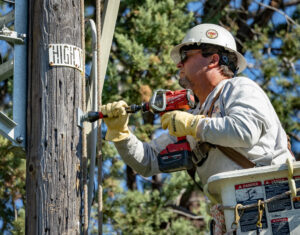
Journeyman Lineman Chad Crosthwait installs a new reclosure.
“My role is pretty multifaceted, since we’re such a small utility,” said IBEW 1245 member Kahli Johnson, who works for the city as an electrical engineering technician II. “We create work orders for the linemen for different poles that need to be rebuilt or replaced, adding transformers, those kinds of things… and we also do all the mapping of the poles, all of our electrical lines and services. We also project manage large jobs, such as the undergrounding. We are part of the initial phase of design, all the way up to estimating costs, and then doing the bid walkthroughs and project managing from there. So, we wear a lot of hats.”
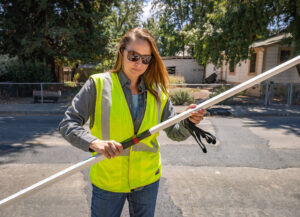
Electrical Engineering Technician Kahli Johnson extends a measuring stick to measure a pole for an upcoming project.
“We do it all here: underground, overhead, we’re pretty diverse in distribution here. We do everything,” echoed Line Crew Foreman James Jeffers, an eight-year member of IBEW 1245.
Managing and monitoring the extensive utility infrastructure in this heavily wooded, high-fire-risk area is no small task. Recently, the utility has begun using Remotely Piloted Aircraft Systems (RPAS), more commonly known as drones, to enhance their inspection program.
“We have maybe a half-mile of transmission line that comes off the substation. Those are tall poles that our buckets can’t reach, so the drone helps us to be able to inspect those closer,” explained Electrical Technician I Grady Hurn, who is also a licensed drone operator for the City of Ukiah. “A lot of our poles on the hydro line that goes out to Lake Mendocino, they’re also tall poles for tree clearances … and we’ve been able to inspect those closer than we have before.”
Hurn appreciates how the drone enables his department to cover more pole-top inspections faster and more efficiently.
“Before, we’d actually have to de-energize the line, send a guy up climbing, because our buckets don’t reach the top, and physically inspect it,” said Hurn, who spent 10 years working on a crew as a journeyman lineman. “Now, we’re able to leave it energized, fly the drone and get some pretty very detailed photographs.”
***
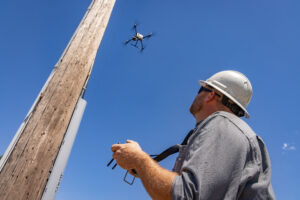
Electrical Tech Grady Hurn uses a drone to inspect poles and power lines for the utility.
As a Mendocino native, Hurn always knew that he wanted to work for the Ukiah electric utility.
“I worked in the parks department, the golf course, and I was an electric and water meter reader for a couple of years,” he recalled, explaining the steps he took to get a foot in the door with the City. “Then they had an opening here [in the electric department] that I applied for, and I eventually got it and I’ve been here ever since. I absolutely love working for the electric department by far.”
Jeffers, a Bay Area native, has been with the City of Ukiah for eight years. A graduate of Northwest Lineman College in Oroville, Jeffers hired on at Ukiah right after he journeyed out as a lineman in Texas. He appreciates the work-life balance that he’s found working for the city.
The IBEW 1245 members at Ukiah’s electric utility generally have an amicable relationship with their employer, but they still recognize the value of IBEW 1245 representation in their line of work.
“If we weren’t union backed, we probably never would have gotten the gains we recently got in our equity adjustment,” said Jeffers, who served on the bargaining committee along with Hurn. “It’s nice having someone to call … for opinions on day-to-day things we run into working with management. I think it plays a big impact on working relations with the employer.”
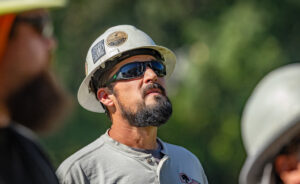
Line Crew Foreman James Jeffers keeps a close eye on his crew.
“And when you’re working union, you know about everything that goes on, so if there’s a safety issue [at another utility], whether it be big or small, you hear about it through your union rep,” he added. “It’s kind of great. It gives the guys a perspective of what could happen or what might happen.”
“[The union] wants to make sure you’re getting the job done safe, with the right equipment and you’re doing it the right way,” echoed Hurn. “I feel like our employer has our back pretty well here, but I know at some places they don’t. Without the union, employers can take advantage of their employees and put them in situations that could be unsafe.”
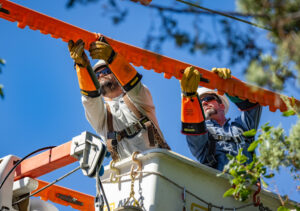
Journeyman Linemen Dustin Butler, (left) and Dennis Pardini.
“I think that the union’s really advocated for us… I felt like they’ve prioritized us, even though we’re so small, and they’re easy to get in touch with if you have an issue,” said Johnson. “I think we have a good culture here. The linemen are awesome and very helpful. In the engineering department, we’re very small, and it kind of creates a real sense of community.”
–Rebecca Band, IBEW 1245 Communications Director
Photos by John Storey